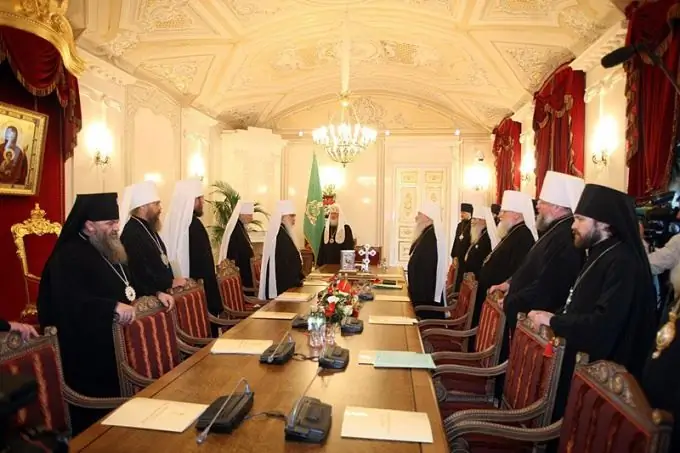- Author Antonio Harrison [email protected].
- Public 2023-12-16 07:44.
- Last modified 2025-01-22 21:44.
The Orthodox Christian Church in Russia is, in essence, a state within a state, with its own laws, orders and traditions. Accordingly, this state also has its own authorities, which monitor the implementation of church canons. One of them is the Holy Synod.

Functions of the Holy Synod
The Holy Synod deals with all organizational issues of the Russian Orthodox Church, including interaction with foreign and so-called heterodox religious associations of any type.
In addition, he is responsible for the interaction of parishes within the country, the implementation and observance of Christian canons and orders, the adoption of the most important organizational and financial issues.
The Holy Synod is engaged in the popularization of the Orthodox faith not only among residents within its own country, but also abroad, performing such work only within the limits of state legislation. Suppression of attacks by representatives of other faiths and incitement of ethnic hatred based on religion also lies on his shoulders.
The history of the creation of the Holy Synod
The need to create a governing body of church authority was initiated by Peter I back in 1700, after the death of Patriarch Adrian. In the opinion of the Russian tsar, the continued existence of Orthodoxy without proper government was impossible, since the solution of pressing issues was not organized and church affairs inevitably moved towards decline.
The first "representative" of the church authority was the so-called Monastic Order, which was renamed the Theological College in 1718 and received its own charter - the Spiritual Regulations. And already three years later, the governing body of Russian Christianity was recognized by the Patriarch of Constantinople Jeremiah III and received its present name - the Holy Synod.
Everyone who was present in this high-ranking meeting or became a member of it were obliged to pronounce an oath, which in its importance was equated to a military one, and violation of it was severely punished. A little later, the Most Holy Synod received more extensive and significant positions and was in charge of not only church affairs, but also palace affairs, some of the powers of the treasury and the state chancellery, and the royal archive was also in charge.
Holy Synod of our time
In the modern Orthodox Christian Church, the Holy Synod performs the same functions as in tsarist Russia, with the exception of performing matters of state significance. He is in charge of diplomatic, financial and economic affairs of the patriarchy of Russia, he is engaged in decision-making on the ranking of leading posts, the distribution of posts and the strengthening of international relations, but only within the framework of religion.






